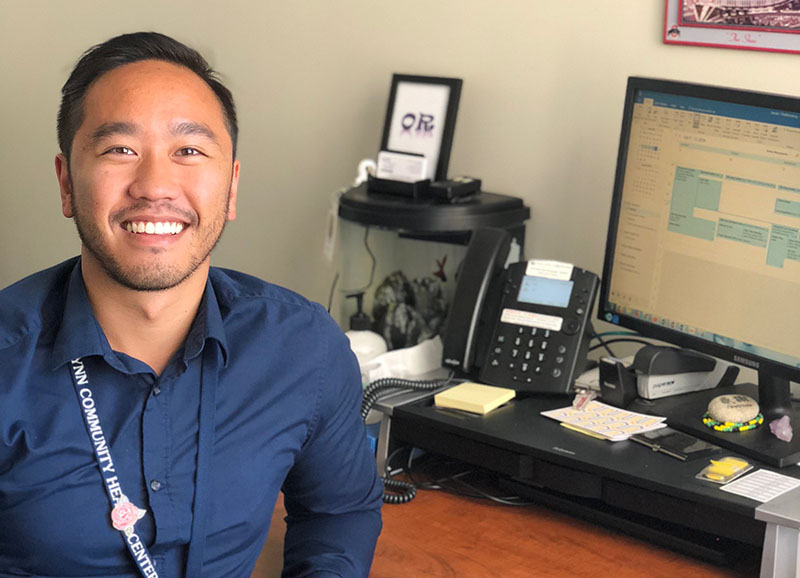Thursday, March 21, 2019

What does it mean to be a public health social worker? CISWH’s Boston University Advancing Leadership in Public Health Social Work (BU-ALPS) project explores the career paths and impact of MSW/MPH alumni.
Dan Do, LICSW, MSW, MPH, Integration Care Manager Project Director, Community Health Center, Lynn, MA
Dan Do is a 2013/2014 graduate of the MSW/MPH Program at Boston University. He majored in Clinical Practice at Boston University School of Social Work and Social and Behavioral Sciences at Boston University School of Public Health. Dan says that “Originally, I’d wanted to go to medical school. But then I was introduced to public health as an undergraduate and realized I was interested in health as a whole, including epidemiology and social sciences. During my gap year working with City Year, I found social work and that’s when I knew I would only apply to MSW/MPH programs.”
Like many MSW/MPH students, Dan was drawn to both clinical and macro social work courses, and multiple areas within public health such as health communications, health policy, and maternal and child health. He was inspired, when, during one of his courses, the students acted as consultants to the Boston Public Health Commission’s work in the Charter School system. He used all his social work and public health skills to help craft a set of recommendations for wellness programing into a “truly great deliverable. The BPHC thought so too, as they created a position to implement the wellness recommendations and hired one of the students to fill the role. That was my ‘ah-ha’ moment when I realized what it could be like to be a public health social worker.”
“Every day, I get to train a diverse team of providers to better understand mental illness.”
“My current title is Integration Care Manager Project Director; I direct an Integrated Primary Care team within a behavioral health team that is located in a larger Federally Qualified Health Center. My team is comprised of a family physician, family nurse practitioner, two registered nurses, a medical assistant, a peer support coach, a community health worker, a substance abuse specialist and a referrals specialist. We collaborate with 40 therapists and psychopharmacology providers to increase access to primary care services for people with serious mental illness and to help keep them engaged in care. I also manage the 4 year 1.6 million-dollar SAMHSA grant that provides funding for this team and am the Site Principal Investigator for Harvard’s Center for Primary Care Advancing Teams Accelerator Program. This is a great project which enables the team to implement hypertension treatment in an integrated behavioral health setting. My education plays a big role in the work I do now…having the advanced degree in public health allowed me to do more systems thinking and analysis.”
He notes that public health social work is increasingly visible in the arena of primary care and behavioral health integration. “This position is certainly public health social work. I utilize my skills as a clinically trained social worker with a public health background in an interprofessional setting. Every day, I get to train a diverse team of providers to better understand mental illness, to apply a social work lens to engage people in treatment, to utilize public health programming and design to create new health promotion activities, and to evaluate them for their efficacy and efficiency.”
Dan’s advice for students and the field: Be flexible in how you conceptualize public health social work. “It is not public health AND social work that you are doing. It is public health social work. I think people try to define which parts of them are public health and which are social work and that impedes a full integration at the conceptual level. You want to be able to dance between both realms seamlessly without worrying about which field is carrying the weight. Social work as a whole is a toolkit and a lens to view, define and address issues from a social justice and strengths perspective. Public health is the science and methodology at a population level which helps you act on those issues. It is possible and important to integrate both of these, regardless of your area of practice.”
Note: Dan recently left his position to return to doctoral education. He maintains his private practice serving culturally diverse populations.
This profile is excerpted from Advancing Leadership in Public Health Social Work Education: MSW/MPH Program Handbook. This free resource, designed to help schools with their efforts to establish, promote, improve, and evaluate MSW/MPH programs, was produced by CISWH’s BU-ALPS project and funded by the Health Resources and Services Administration (HRSA) of the U.S. Department of Health and Human Services. This information or content and conclusions are those of the author and should not be construed as the official position or policy of, nor should any endorsements be inferred by HRSA, HHS or the U.S. Government.